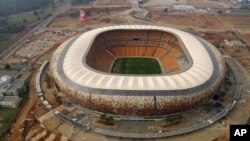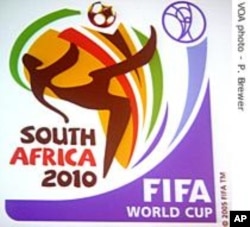South Africa has announced that last year, the number of foreign visitors hit an all-time high. Tourism minister Marthinus Van Schalkwyk told a travel industry conference in Cape Town that in doing so, an estimated 9.9 million travellers had defied a global recession and a 4% drop in worldwide travel in 2009. Although European and North American traffic declined, he said, arrivals from Africa, Asia, and South America all climbed.
South African-born Kenneth Hieber is founder and director of 2Afrika, a New York City travel agency he has operated since 1995. He says that with the World Cup beginning in three months’ time (on June 11), an even greater number is expected this year, including a surprising number of Americans.
“As I’m led to understand, the majority of people that are coming to the World Cup soccer are actually coming from the United States of America, per capita versus the other countries. But with all of the media attention focused on the World Cup, it certainly puts South Africa in a very positive spotlight,” he said.
Hieber explains that South Africa’s growing appeal to travelers from developing countries stems from a concerted effort by the national tourism industry, as well as Pretoria’s predilection for setting international monetary policy.
“Certainly, South African Airways and South African tourism are very aggressively marketing the destination. Because of the rates of exchange against the fluctuating South African Rand, it is an extremely affordable destination. It’s the affordability of the country or of any vacation one would take within the Republic of South Africa that is making it a rising destination to otherwise developing countries,” he said.
As the first nation to host a World Cup tournament on African soil, South Africa has weathered added scrutiny to meet international standards both for its guest accommodations and its stadiums and sports-related facilities. As a travel operator, Kenneth Hieber says he is confident that his countrymen will apply integrity and great organizational skills to host the event “with an enormous amount of flare and integrity.”
Airline service is expected to be at a peak during the tournament, so land transportation is the method of choice for tour operators to transport spectators between various venues for the matches. Hieber says the strategy of booking fully inclusive tours (FIT’s) takes into account that not all fans will be attending the same matches or the same number of contests.
“People may have tickets for one game and not another. And between that time, they may want to use certain activities that you really have to custom design…so we’re treating every reservation as a fully inclusive tour and tailoring it to the needs of the passenger,” he said.
Hieber says the experience of acting as standard bearer for the continent and welcoming an international audience to a world-class tournament will supplement their understanding of other cultures. For South Africans, who endured years of international isolation under an apartheid regime, he says hosting an event of such magnitude will help South Africans exchange traditions with their guests and also learn from them.







